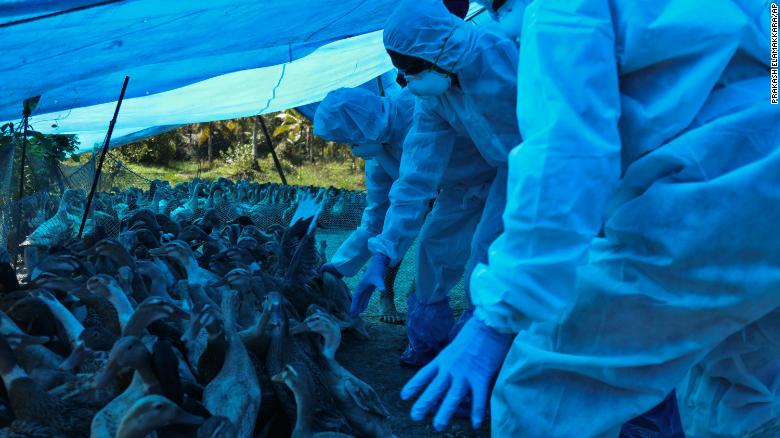New Delhi India has begun culling tens of thousands of poultry birds after avian influenza was detected in ducks, crows and wild geese in at least a dozen locations across the country.
The country’s Ministry of Fisheries, Animal Husbandry and Dairying issued an alert on Wednesday, urging states to take measures to avoid any further spread of the disease.
The southern state of Kerala ordered the culling of more than 38,000 poultry birds on Tuesday after reports of dead birds infected with the disease emerged in two districts, according to the state’s Minister for Animal Husbandry, K. Raju. “Nineteen rapid response teams have been formed for this,” Raju said.
About 17,000 birds have been culled in Kerala so far, and eggs have also been destroyed in some districts.
The northern state of Himachal Pradesh reported the death of more than 3,000 birds from the disease, mostly bar-headed geese at a wildlife sanctuary, according to Archana Sharma, a senior official in the state forest department.
“The birds affected are migratory birds. All we can do is follow the strategy of clearing up the area of contamination. We comb the entire area of the sanctuary and we physically send 10 teams every day who search for any dead birds and dispose of them,” Sharma said.
The alert comes as India continues to battle the coronavirus pandemic, which has infected more than 10.3 million people in the country, and is about to embark on one of the most ambitious mass vaccination programs ever undertaken.
Avian influenza, also called avian flu or bird flu, is an illness that usually only affects birds. There are many different strains, but the most commonly seen and most deadly form of the virus is called Influenza A (H5N1), or the H5N1 virus.
In India, the disease spreads mostly through migratory birds entering the country during the winter season.
Most cases of human bird flu infections are due to contact with infected poultry or surfaces that are contaminated with infected bird excretions: saliva, nasal secretions or feces.
Symptoms of avian flu include fever, cough, sore throat and sometimes severe respiratory diseases and pneumonia.
There have been no reports of avian flu transmitting to people in India so far during this outbreak.
“There is no need to panic,” Minister of Animal Husbandry, Dairying and Fisheries Giriraj Singh, told public service broadcaster Doordarshan on Wednesday. “We also provide compensation to farmers for the birds that have to be culled.”
Other countries in Asia have also experienced outbreaks of bird flu this winter. In November, hundreds of thousands of chickens were culled in Japan after cases of avian flu were detected in poultry.
A farm in the city of Hiroshima culled 134,000 chickens after avian flu was detected for the first time on its premises since 2004.
>>>>

